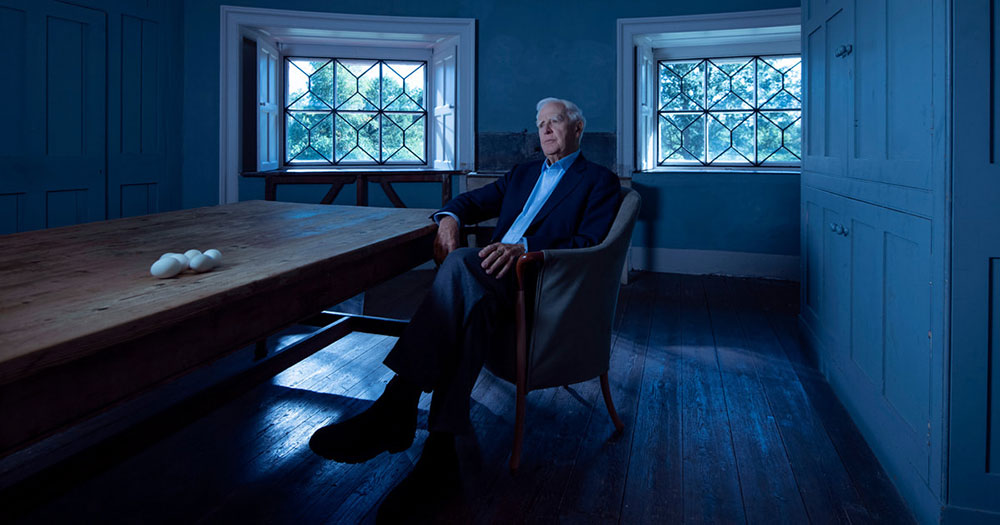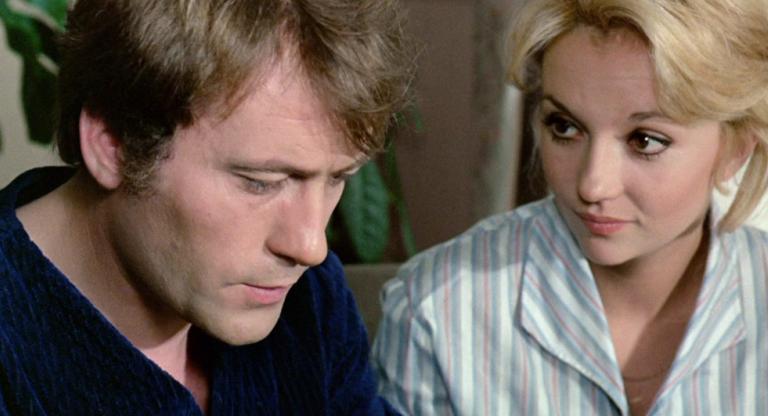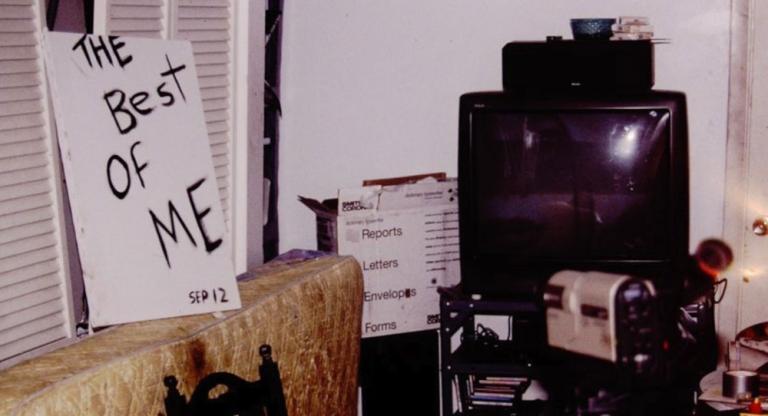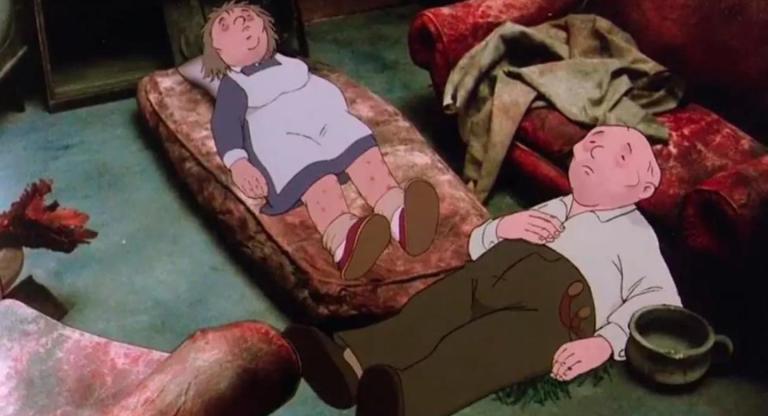The Pigeon Tunnel (2023) joins a long line of Errol Morris films about tale-spinners, but his latest subject is doubly, or triply, qualified. David Cornwell wrote best-selling spy novels under the name John le Carré, snooped for British secret intelligence, and grew up with a father, Ronnie, who was a career con man of grand proportions. Cornwell (who died in December 2020) is an exceedingly eloquent speaker, delivering an extended meditation on the pursuit of fictions (Cold War and otherwise), betrayal, and the mysteries of attachment. It is also, perhaps more explicitly than any Morris movie yet, the filmmaker’s self-portrait. There’s fertile ground here: like ex-spymaster Cornwell, Morris had an alternate career, as a private detective; unlike Cornwell, but productively so, Morris has written that he has no memories of his own father (a military doctor who died suddenly of a heart attack when Morris was a toddler); and, of course, their shared, circling interest in the phenomenon of the unknowable and its implications for philosophy and ethics. But above all, though often acclaimed as master practitioners (of documentary, of espionage fiction), they’re both artists, and in The Pigeon Tunnel, game recognizes game.
Drawing on Cornwell’s memoir of the same name, the film moves with a palpable freedom, without the burden of expectations set upon his interviews with contentious political figures in the past two decades—from the Oscar-winning triumph of The Fog of War (2003) to the exasperated critical response to American Dharma (2018). I have interviewed Morris a number of times over the years, and it’s nothing new to encounter revisions or resistance to questions; this instance was no exception, but with a friendly tone of dry sarcasm. (Also, for whatever reason, we always seem helplessly drawn to recapitulating the invention of the Interrotron, Morris’s interview contraption.) At a Soho hotel, not long after The Pigeon Tunnel screened in the New York Film Festival, I spoke with Morris about the making of the movie, the power of parables, echoes from TV and literature, the trouble with producers, and the burning of the world.
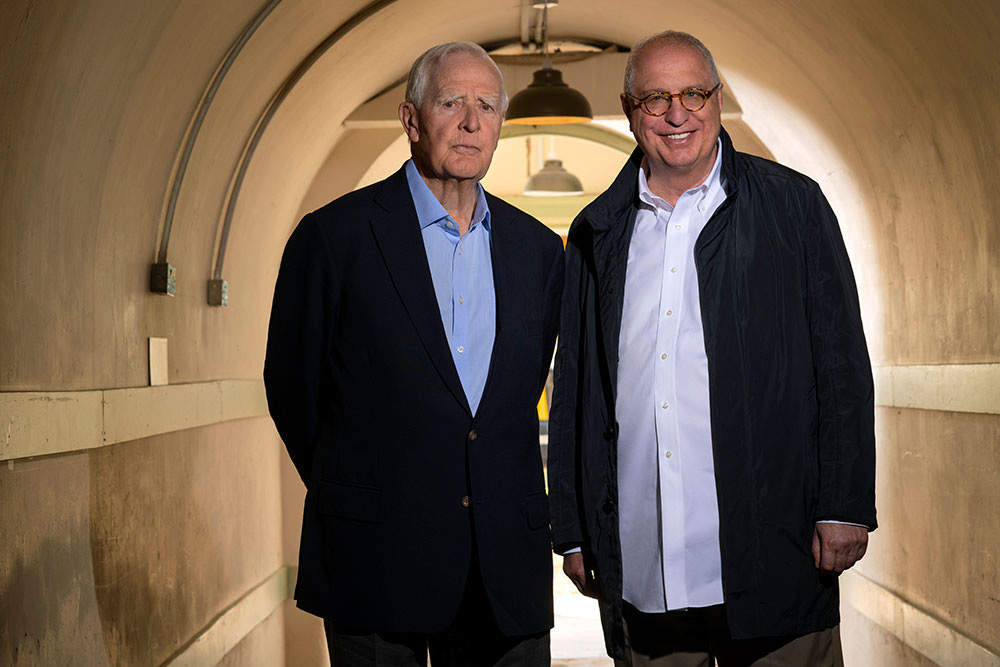
Nicolas Rapold: At the beginning of the movie, David Cornwell says he watched your movies and then wondered which “Errol Morris” you were going to be: a spectral figure, or the friend across the fireplace, and so on. So who do you think you were?
Errol Morris: Well, I don't buy that whole deal. It's contrary to how I see interviews and how I conduct interviews. My interviews are not adversarial, consciously so. They don't come with a preconceived idea of what the interview is going to be like, or questions that I'm going to ask, or anything of the sort. The question of “Who are you?”— David answers the question at the end [of] who he is, I suppose: He's an artist. He's a writer.
NR: I also sensed an idea of writing as spying, in a way.
EM: I don’t know if writing is spying. To just observe the world and become part of the world, is that being a spy? I don't think so. But I was struck how documentary research was part of almost everything David did. He would go places, he’d talk to people. He’d involve himself with history, I think, is the best way to describe it. The whole movie starts with this parallel between The Spy Who Came In From the Cold and history. That connection between the Berlin Wall and that entire story is striking.
NR: Were you already aware of the particular photo of a woman dangling at the Berlin Wall, which you use? It’s so strongly echoed in The Spy Who Came In from the Cold.
EM: I was not aware of it. And they do look very similar.
NR: The opening of the film suggests that a sense of risk is important to le Carré’s writing.
EM: I think that's probably true. But I keep comparing him and [Joseph] Conrad, and I don't think it's a false comparison. Conrad is really journeying around the world and turning these journeys into literature. Whether it's Lord Jim or Heart of Darkness or Nostromo, there's this overlap between his own experiences of history and the various works he wrote. And it's true of David, as well.
NR: Hearing David’s account of working for MI5 or MI6, did you get a deeper sense of what spies do?
EM: I don't know what they do. I was a private investigator. I know what investigators do. They investigate. Spies are usually—if I understand the concept—employed by governments. You're working for the Soviets, or the Russians. You're working for the U.S. or the Crown, and trying to obtain information that is useful to your government. I don't know if it's changed. At the very beginning of the movie, David starts talking about interrogations and interviews, making me wonder: is an interview an interrogation? I don't think it is, properly considered. I just think they are different. When I think of an interrogation, of course, I think of cops.
NR: Cops or the TV show Cops?
EM: Well, cops in general, not the TV show. Although I did love Cops. My wife had a really great line about Cops: “It’s the only place where you get to see truly authentic decor.” But when you're interrogating, you're interrogating to some end. There's something you want to find out. There’s information you want divulged that you know someone probably does not want to give you and you're going to have to extract in some way. Versus . . . My interviews have a certain kind of character to them. Because from the very beginning, I tried not to direct my interviews. I call it the “SHUT THE FUCK UP” school of interviewing, allowing something to just emerge. Where questioning becomes not an important part of it at all.
I know a lot of people would ask me: You're dealing with a guy who was a spy, an interrogator, blah blah blah. How did you feel about talking to a person like that? I don't know! I was talking to him. But I was interested in how he sees the world and how he sees himself.
NR: I would say you had what he called a “friend across the fire” conversation.
EM: Yeah, I think it was friendly most of the time. And I love the pigeon tunnel. I love the parables.
NR: Is the pigeon tunnel how it feels when you make a movie and it's out in the world? [The “pigeon tunnel” refers to a pigeon-shooting setup at a Monaco hotel that Cornwell’s father frequented in which the birds flew out blindly to be fired upon.]
EM: Well, everything feels like the pigeon tunnel. I mean, the thing about his parables is that you don't know really what they mean. You know that it’s Sisyphean. You know that the pigeons are just flying out from this tunnel over the Mediterranean, where shooters are winging them, killing them, and then they just circle back and do it again. Again and again and again. Inexorably, except interrupted by death.
NR: I wondered what to do with that. Is it liberating to think that’s just the way life is, so don’t worry about it?
EM: I wouldn't say it’s terribly liberating.
NR: Betrayal takes up a huge part of the movie, returning to the story of Kim Philby, who betrayed England by spying for the Soviet Union. It makes one think about loyalty to good and bad causes.
EM: Well, David talks about the betrayal of his friends at Oxford who were in the Communist Party, [through his friend] Stanley Mitchell. I ask, “How do you feel about it?” and he says, “I feel fine about it. They were on the wrong side of history. There's good, there's evil. There’s right, there’s wrong. There's Stalin, and there's, you know, the Queen. And one is good and one is bad.”
NR: He doesn’t have a relativist view.
EM: No. There’s no relativism in John le Carré. If anything, I often thought of him as a Kantian. I thought of him as much less cynical than I am. And I find myself becoming more cynical.
NR: Why is that?
EM: Take a look around you! Have a look at today’s newspaper [holds up a newspaper] and ask yourself that question. It's interesting when we're talking about history, because today we live in a sea of supposed conspiracies. I don't believe in conspiracies, because I think that people are too much at cross-purposes with each other—too stupid! too incompetent!—to ever effectively conspire to do anything. I got a booster shot recently, and I told the woman at Walgreens: “I don't want the shot unless you’re planning to chip me at the same time.” She said, “Well, I don't think there's a chip here.” I said, “Oh, that's too bad. I'll get vaccinated anyway.” I mean, it's all Looney Tunes out there. And I'm scared! When I was an undergraduate at the University of Wisconsin, years ago, I demonstrated against the Vietnam War. I told McNamara [in The Fog of War] that I was one of those “outside agitators” demonstrating against the war. But that was a very, very different feeling than now.
NR: When it comes to conspiracy believers, what do you even demonstrate against? What could one do?
EM: I agree, because the country is so horrifyingly polarized. When I made American Dharma, which I still think is one of my best films, it got trapped in the rut of cancel culture, as if this was a movie that should never have been made. Well, it should have been made, and it was made. But it's so crazy that there's a group of people—Bannon is the perfect example—who want to destroy everything. To call them anti-progressive is an understatement. There's no positive program. It's just destroy, bring it all down.
NR: No positive program except for themselves. It’s like when David Cornwell says something about anti-Nazism being smoothly replaced after the war by anti-Communism. The constant is people still grappling for power.
EM: Yes. And I found myself very sympathetic with him. Certainly when he talks about his belief in objective truth, I share that belief. Maybe we can't ever latch our heads onto it, but it's there. Maybe it is, in his words, only seen by an absent third party, but we can try to understand what's out there in the world. Now, it is just crazy. Bannon’s dream—my movie is the only one that would predict January 6. It’s “burn it all down”—and then what have you? I'm not sure. Probably nothing good.
NR: Another huge focus of the movie is David Cornwell’s father, who was a con man.
EM: Sure. His obsession with Ronnie.
NR: He said that Ronnie had these moments of feeling real, but it seems like those coincided with when he was being most fake to other people.
EM: Yeah, I mean, everybody grows up in some kind of strange phantasmagorical world. Maybe him more so. I didn't really explore how David’s infidelity is related to his father's infidelities, and on and on and on. I told a story anchored in the pigeon tunnel itself, and his philosophical parables about the world, and his obsession with writing. But someone asked a question at the end of the Q&A in Alice Tully Hall: “Do you feel you got everything?” Of course I don't feel like I got everything! I've never ever felt such a thing. I felt I got a story, I got a movie, a movie that I'm proud of. And I captured something about David of interest. But I’m not a vacuum cleaner.
NR: That sounds like something you’d ask your dentist in a cleaning: “Did you get everything?”
EM: Yeah.
NR: You have a line in the film where you say something like, “I keep hearing that I didn't ask X or I didn't ask Y.” You were hearing that while making this movie?
EM: Yes.
NR: But from who?
EM: From the producers!
NR: What did they want?
EM: I don't know, you ask them! I don't think anyone knew what they wanted. I know how to make movies because why? [Because] I make them. And it's an emergent phenomenon: a movie comes together in the process of making the movie. I don't have some well-articulated vision that I can just say, “Well, you know, this bolt goes here, this nut goes there.” I knew that the interview was valuable and interesting. And I very rarely have people sitting in [on] my interviews. There's no one sitting with me and Stephen Hawking [in A Brief History of Time, 1991]. Well, there were no real interviews with Stephen Hawking, although Stephen Hawking was really, really funny. And so is David.
NR: In this case, you’re interviewing someone who’s actively a storyteller too. It’s almost like having a co-writer, because he talks like he’s writing a novel.
EM: He’s extraordinarily well-spoken and articulate. He does voices. He even tells me that when he’s writing, he does the voices of his characters out loud. He plays with the sound of the voice. It’s one of the things that's really interesting about him as a creative artist. There’s a musical element in what he does.
NR: You have David Cornwell reading from his writing in voiceover. How’d you choose what to read?
EM: I liked the story of the pigeon tunnel. And I wanted to illustrate—I wanted to do the pigeon tunnel. I think we did it well. It's like some of the producers had not bothered to read the book. These are important elements in his story. This Sisyphean element is at the heart of his fiction and at the heart of himself. What does the pigeon tunnel really mean? It’s like I keep saying: What does a Kafka parable really mean? What does “The Hunger Artist” really mean, or what does “Before the Law” really mean? They're perverse. They're strange. They’re open to multiple interpretations. What does Metamorphosis mean? Do I need to worry that one morning I'll wake up as a giant dung beetle?
NR: Hopefully not.
EM: The pigeon tunnel is endlessly suggestive. This endless repetition, until you die. Whether you're okay with it or not, maybe it’s just the way it is. And the last parable, which is about history: I myself always wondered about [Rudolf] Hess’s trip. Why did he commandeer a plane and fly to Scotland? Did he really think he was going to make peace between the Third Reich and the British government? It’s a great mystery, an unsolved mystery, if you like. And what David does with this mystery is he transforms it into a kind of strange joke. A perverse joke that really doesn't tell you anything except that it tells you about our misguided attempts to understand anything. It tells you about our own self-deceptions, our delusions.
NR: It also turns into a story of not seeing the forest for the trees.
EM: I agree. And it's very funny and very evocative and very David.
NR: You tell him at one point, “I think of you as a poet of self-hatred.”
EM: Yes.
NR: And he’s like, “I'll go with that.” There's a level of ease. Was that because he was toward the end of his life?
EM: I don’t know if he felt like he was at the end. People said, “Oh, you must have known it’s going to be his last interview.” No one knew that! He was in great shape when I was talking. Completely there, completely articulate. Maybe slightly frail, but there was no indication that he was going to be dead within a year and a half. But he was. And when you reach a certain age, people die by falling. He fell in the bathroom, he had a mild concussion, he developed pneumonia, and he was dead within two or three days. And it was actually a shock because we thought he’d be around, and I’d be able to perhaps even talk to him again.
NR: But you started editing before he died?
EM: We started editing immediately, but there were all these disagreements about what this was going to be. This was a very strange process. I mean, there was tension when I was making A Brief History of Time, because Hawking felt very strongly that he didn't want personal details in the movie. And I would always say, “Stephen, read A Brief History Of Time! It’s filled with personal details. What are you talking about? Come on! Let's get real here.” Then when he saw the movie, at CAA in Los Angeles, I was really worried. Is he going to reject this whole thing? And the first thing he said to me, through the voice box, was: “Thank you for making my mother a star.” His mother is a central figure in the story, and he came to love the movie.
NR: He’d been primed to reject the personal part.
EM: He was primed to reject it, and in the end, thank god. I’ll never know, of course, but I think David would have liked this movie. I think it captures something about him.
NR: I also felt a lot of joy in it, which I wasn’t expecting.
EM: I think that’s true.
NR: Did you use the volume of le Carré letters that came out earlier this year?
EM: No, I was not able to read them. But we had this friend in common, and I guess some of his letters are reprinted: Sy Hersh.
NR: Sy Hersh and John le Carré! I wouldn’t know where to begin. Where did you film The Pigeon Tunnel?
EM: Wrotham is an estate in North London. You can see it in lots of movies. It’s in The Crown. I love the library. And we populated everything with mirrors. There’s mirrors everywhere.
NR: How did you do that shot where the image is fragmented left to right?
EM: Oh, you just do it. I don’t know if there’s a primer on how you construct these shots. But the mirrors scared me because, is this going to look horribly contrived? I think it does work. So that’s a relief.
NR: How many cameras were you shooting with?
EM: There were four cameras, maybe five at times. Not like Wormwood, where we had 12.
NR: Was that just too many cameras?
EM: No, I look at making films as an opportunity to experiment in style and form. And I don't need to do everything with 100 cameras, but it was nice to try to do it once.
NR: How do they affect the person you're interviewing?
EM: Well, I developed this interviewing device, the Interrotron. It was solely for us to make eye contact in an interview with a film camera. You’re looking directly into the lens, so you need this system of two cameras and mirrors. You can’t do it otherwise. But it did a number of things that were totally unexpected, because when you put up these two cameras and mirrors—and you see the other person looking directly at you and you’re looking at them—all of a sudden the whole rest of the world disappears. So in answer to your question, are they aware of all these cameras: no. The whole world vanishes.
NR: You do have these illustrative scenes with actors, for the pigeon tunnel and other moments. Was it fun to cast performers for that? You cast an especially good heavy for one sequence.
EM: Yeah, I love doing that stuff. We had auditions! They call it a documentary, and it is a documentary. But it’s filmmaking. And the stuff that I’m doing isn’t in any way different from what you would do in casting a drama.
NR: Who’s your favorite actor in a John le Carré adaptation?
EM: Oh, Richard Burton. No, wait a minute! Alec Guinness.
NR: Well, that’s the thing—which one.
EM: Someone said to me in a phone conversation that they had only seen the most recent Tinker Tailor [2011]. They had never seen the Guinness, which is basically a TV series [Smiley’s People, 1982]. To me, Alec Guinness is one of the great performances, period. Ever. He’s sublime. And I think Richard Burton is sublime. I heard someone say they didn't think he was a good Leamas. Are you kidding me? It was one of the best performances in motion-picture history.
The Pigeon Tunnel screened at the New York Film Festival. A theatrical engagement opens on October 20 at the Angelika Film Center.
